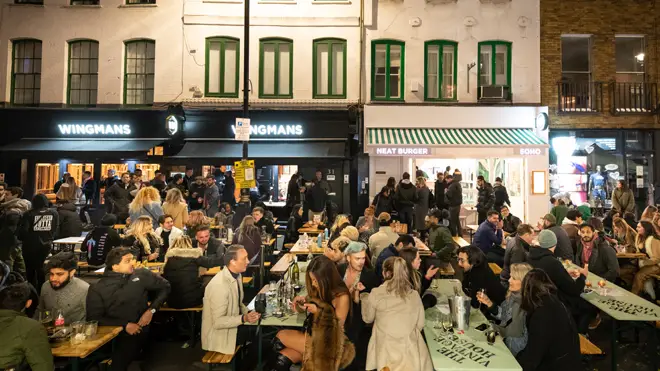
Ben Kentish 10pm - 1am
15 April 2021, 06:36 | Updated: 15 April 2021, 07:39

Doctors have warned of the importance of having good ventilation in pubs, restaurants and offices to prevent another spike in coronavirus in England.
The British Medical Association (BMA) said the Government has said more needs to be done to guard against airborne transmission of the virus.
Pubs, bars and restaurants, workplaces and other public settings should be given ventilation guidance as they welcome the public indoors again, the BMA added.
Scientists previously criticised the Government over its August 2020 cut price meal scheme, Eat Out to Help Out, which was linked to a rise in cases in the autumn when customers returned to restaurants in huge numbers.
READ MORE: Covid jabs could be required for care home staff in England
READ MORE: Covid-19 case rates fall to lowest levels in seven months
The warning comes as new analysis revealed Covid-19 rates have dropped below 100 cases per 100,000 people in all local areas of UK for the first time since September.
It is almost a complete turnaround from how the data looked three months ago when the second wave of coronavirus was at its peak.
In a study published in the British Medical Journal, researchers from the University of Leicester, the University of Hong Kong, Edinburgh Napier University and Virginia Tech in the US, said the "tiniest suspended particles can remain airborne for hours".
They added: "People are much more likely to become infected in a room with windows that can't be opened or lacking any ventilation system."
The article added: "It is now clear that Sars-CoV-2 transmits mostly between people at close range through inhalation.
"This does not mean that transmission through contact with surfaces or that the longer range airborne route does not occur, but these routes of transmission are less important during brief everyday interactions over the usual one-metre conversational distance.
"The transmission of Sars-CoV-2 after touching surfaces is now considered to be relatively minimal."
The authors urged governments and health leaders to "focus their efforts on airborne transmission".
Dr Chaand Nagpaul, chairman of council at the BMA, said the article emphasised how "crucial" clean airflow is.
He added: "There has been much discussion by the Government and in the media about 'hands, face and space' but much less about the critical importance of fresh air and throughflow in buildings and on public transport.
"As restrictions are eased, and there is greater mixing between people in enclosed spaces, it is vital that measures are taken to ensure adequate ventilation.
"This should include explicit specifications on ventilation requirements in public and work settings, including in the hospitality sector such as restaurants, bars and pubs.
"Investment will also be needed to make sure our hospitals, clinics and GP surgeries are ventilated correctly and that our NHS workers and patients are kept as safe as possible.
"A failure to ensure adequate levels of ventilation in indoor areas runs the serious risk of a rebound increase in Covid-19 infections.
"Crucially, patients and the public need to know they are as safe as they can be and at low risk of becoming infected with Covid-19 when they return to the office, go shopping or go into leisure settings."
The plunge in Covid-19 case rates reflects the success of the lockdowns imposed across the UK just after Christmas, which helped limit the circulation of the virus as well as drive down levels of infection within the community, while the rollout of Covid-19 vaccines is also likely to have played a role.
In the week to January 10, only five of the UK's 380 local authority areas had rates below 100 - and some parts of the country were seeing rates rocket above 1,000 cases per 100,000.
The latest figures, which have been compiled by the PA news agency from health agency data, are for the seven days to April 10.
The highest rate anywhere in the country is currently 98.8 cases per 100,000 in Mansfield in Nottinghamshire.
The lowest is just 1.0 in both Rother in East Sussex and North Devon, while the Orkney Islands and Western Isles are currently recording no cases.
Elsewhere in the UK, the rate in the Scottish Borders is 2.6 and 1.1 in Monmouthshire in Wales, while the lowest rate in Northern Ireland is currently 12.9 in Mid & East Antrim.
Meanwhile, the Government is considering making vaccination of people working in care homes with older adults mandatory.
Listen & subscribe: Global Player | Apple Podcasts | Google Podcasts | Spotify
The Department of Health and Social Care is launching a five-week consultation on the issue to seek views on the proposal, any potential impact it could have on staffing and safety, how it could be implemented and who could be exempt, with a decision expected in the summer.
It follows an ongoing row over the potential introduction of Covid health certificates which could be used to access settings such as theatres, nightclubs and mass events, and might also be used in pubs and restaurants to reduce social distancing restrictions.
A Government review into the so-called vaccine passports continues and the Guardian reported a submission from the Equality and Human Rights Commission said they could be a "proportionate" way of easing restrictions, but risked "unlawful discrimination" against people from disadvantaged or ethnic minority backgrounds by restricting access to jobs and services.